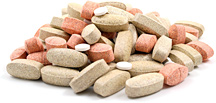"(A) company might make a product that really is natural, and label it as such, or it could be made of nine synthetic ingredients, with just a little plant extract thrown in."
This quote from Daniel Fabricant, vice president of scientific and regulatory affairs at the
Natural Products Association in Washington, D.C., sheds light on how a product may be called "natural" or "organic" even if most of the contents are neither.
The U.S. government has no absolute definition of natural. Therefore, when a company uses terms such as natural or all-natural, that does not mean its vitamins are not synthetic. It is important to always check the label for proof that the product contains 100 percent natural ingredients.
Myth: Synthetic Vitamins Are Just as Effective as Natural Vitamins
This is a complete myth, and here are two examples. Vitamin C occurs naturally in fruits in two ascorbate forms with bioflavonoids. Non-food, so-called "natural" ascorbic acid, is made by fermenting corn sugar into sorbitol and then hydrogenating it until it turns into sorbose. Acetone (commonly referred to as nail polish remover) is then added to break the molecular bond, creating isolated, crystalline ascorbic acid. Ascorbic acid does not contain ascorbate or bioflavonoids; thus, it is too incomplete to be called vitamin C.
Another popular vitamin supplement is vitamin E. Natural vitamin E is found in foods is [d]-alpha tocopherol, whereas chemical synthesis produces dl-alpha-tocopherol, which is synthetic. Natural vitamin E has up to four times the antioxidant capacity of synthetic vitamin E. In addition, synthetic vitamin E has less ability to correct vitamin E deficiencies than vitamin E from food. The body retains natural vitamin E 2.7 times better than synthetic forms.
 To put it simply, natural vitamins cannot be invented. The fact that some drugs are similar chemically to vitamin D as found in foods does not make them true vitamins. It is important to read the labels of all supplements to see if the products are truly 100 percent food. If even one USP vitamin synthetic substitute is listed, then the entire product is probably not real food. The best source of vitamins comes from certified organic foods grown in fertile soil and organic, real-food supplements that contain the proper combination of nutrients to make vitamins effective.
To put it simply, natural vitamins cannot be invented. The fact that some drugs are similar chemically to vitamin D as found in foods does not make them true vitamins. It is important to read the labels of all supplements to see if the products are truly 100 percent food. If even one USP vitamin synthetic substitute is listed, then the entire product is probably not real food. The best source of vitamins comes from certified organic foods grown in fertile soil and organic, real-food supplements that contain the proper combination of nutrients to make vitamins effective.
Myth: If You Take Vitamins Regularly, You Don't Need to Exercise
There is no substitute for exercise. The body requires proper nutrition and consistent physical activity to optimize function. The benefits of circuit training, a 30-minute walk, or other physical activity cannot be replaced - especially for people who are overweight or have high-blood pressure or a heart condition. Just consider this quote from F. Patrick Robinson, a biobehavioral research fellow at the University of Illinois-Chicago: "There's a decade of research that shows that aerobics and weight lifting can reverse metabolic complications. Some studies have revealed that exercise helps decrease triglyceride levels and may help with the reduction of localized weight gain and improve sensitivity to insulin."
Richard Drucker, ND, is a licensed naturopath who has been performing concentrated research and work in the natural health and nutraceutical fields for more than 20 years. He is the CEO of Drucker Labs (www.druckerlabs.com).

